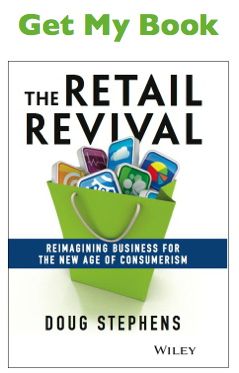
By Doug Stephens
Perhaps the most profound lesson we can take from history is that it has a tendency to repeat itself.
In particular, history shows that each time a new technology comes along, there were those who completely dismissed it, sometimes because of early flaws or imperfections and sometimes because they were just too mired in their own reality to see beyond it. For example, in 1876 Alexander Graham Bell and his financial backer Gardiner G. Hubbard attempted to sell the patent for the telephone to Western Union for $100,000.00. Chauncey M. Depew, then head of Western Union appointed a committee to study the potential investment. In part, this is what the committee had to say…
“Messer Hubbard and Bell want to install one of their “telephone devices” in every city. The idea is idiotic on the face of it. Furthermore, why would any person want to use this ungainly and impractical device when he can send a messenger to the telegraph office and have a clear written message sent to any large city in the United States?”
Which company would you rather be a shareholder in today?
Since then, just about every other major technological breakthrough has been met with often-astonishing levels of initial skepticism; the automobile was generally received as being too expensive and unreliable to be commercially viable. DEC Founder Ken Olson said “There is no reason for any individual to have a personal computer in his home.” E-commerce was famously panned in Newsweek by Clifford Stoll in 1995 as something that would just never take off. And these are only some of the breakthroughs that have been received with similarly dismissive treatment, only later to prove to be indispensable rungs on the ladder of civilization.
Today, as I write this, some are calling out Google Glass as a silly, over-the-top vanity device only nerds (not to be confused with geeks) would wear. Some are calling social commerce as elusive as “a unicorn” – citing its comparatively minuscule returns in sales. Some are decrying big data as nothing more than a “ parlor trick” and a solution looking for a problem! These and lots of other nascent technologies are being met with a jaundiced eye, both by businesses, consumers and pundits alike. And it’s a colossal mistake.
“Don’t look at the finger, look at where it’s pointing.”
Smart businesses won’t judge any of these technologies purely on their face value but rather on what they suggest directionally. Is Google Glass the future? Perhaps not but is it indicative of a new era of pervasive, wearable computing that will alter how humans interact with data? Unequivocally. Is Facebook where we will do all our shopping? Maybe not. But is it reasonable to assume that our consumer lives and social lives will more closely integrate over time, whichever network or interface that happens through? Absolutely. Is big data likely to be the salvation of every business? No way. But can it give a distinct edge to those who master its potential; helping them suss out hidden correlations ? You bet!
It’s so easy to join the chorus of “no” around new technologies as they emerge.  So easy to dismiss what challenges the status quo. Saying no requires no effort or investment at all. It’s much harder, however, to project beyond the early imperfections you might see in something, envision the future impact it could have, and place a prudent bet. Saying “yes” is something that takes imagination, strategic agility and courage – all of which are sadly lacking in business today. And therein lies an inherent advantage of starting with “yes”.
So easy to dismiss what challenges the status quo. Saying no requires no effort or investment at all. It’s much harder, however, to project beyond the early imperfections you might see in something, envision the future impact it could have, and place a prudent bet. Saying “yes” is something that takes imagination, strategic agility and courage – all of which are sadly lacking in business today. And therein lies an inherent advantage of starting with “yes”.
There’s no more time for fast-followers. Things are moving way too fast. You need to quickly identify, understand and try new things as they come and make a decision. Yes or no? And before you answer, ask yourself one other question; which side of history do you want to end up on?

